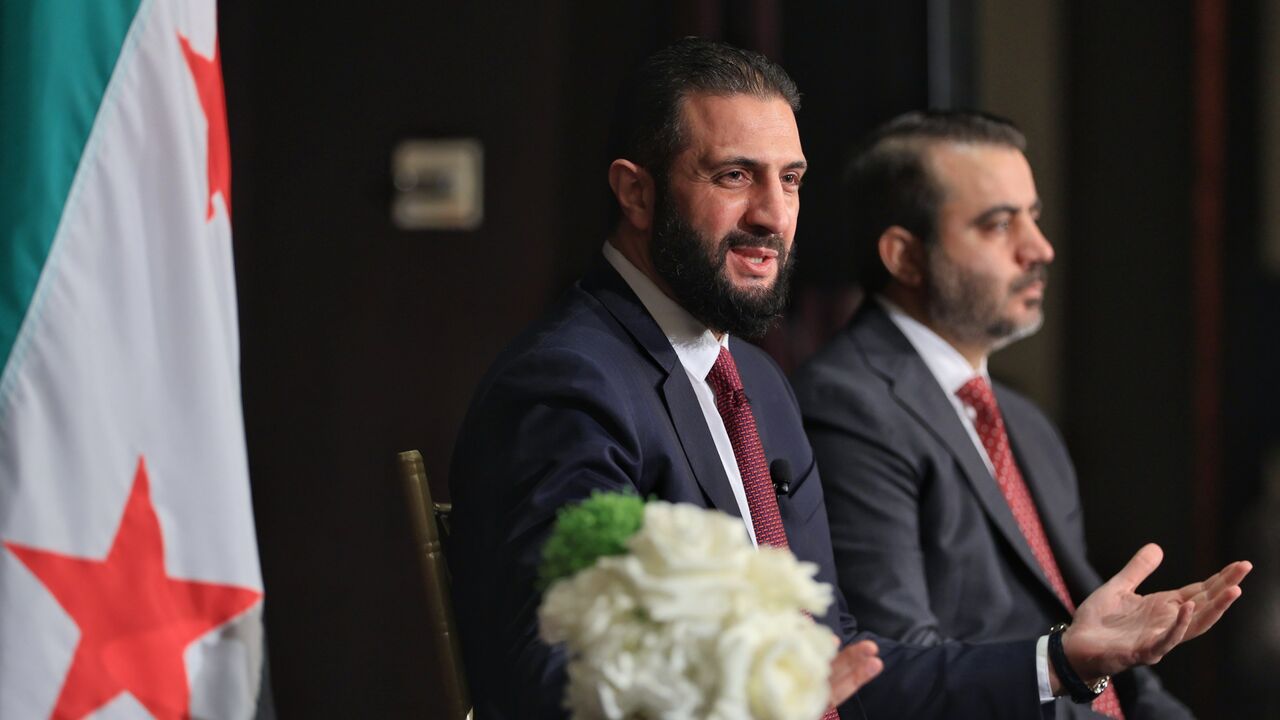The UN visit of Ahmed Hussein al-Sharaa, the leader of Syria’s transitional government who changed his name from Abu Mohammed al-Julani, demonstrates that Western countries are replacing their post-9/11 consensus on counterterrorism cooperation with a sort of narrow geopolitical logic.

Syrian President Ahmed al-Sharaa meets in New York City with a delegation from the Syrian community in the United States, Sept. 22, 2025.
At the recent UN General Assembly, Ahmed Hussein al-Sharaa, the leader of Syria’s transitional government, not only delivered a public speech but was also enthusiastically received by numerous Western leaders. Bizarrely, just a few months ago, this man was known as Abu Mohammed al-Julani, the terrorist leader for whom the U.S. State Department had offered a $10 million reward. The group he leads — Hayat Tahrir al-Sham — has long been considered closely linked to al-Qaida and was designated as a foreign terrorist organization by the United States.
Now, after changing his name, he has become a guest of honor in New York. The warm reception shown by the U.S. and other Western countries to al-Sharaa stands in stark contrast to their previous indifference toward the Afghan Taliban and once again demonstrates that Western countries are replacing their post-9/11 consensus on counterterrorism cooperation with a narrow geopolitical logic. In my opinion, this opportunistic and selective counterterrorism stance is not only a significant historical setback but will also have profoundly negative consequences.
First, this selective counterterrorism stance may rapidly erode the basic consensus on global counterterrorism cooperation that emerged after 9/11. That cooperation has long faced a profound paradox: a “terrorist” in one country might be considered as a “freedom fighter” in another. The difference has created a huge space for transnational terrorist activities, allowing violent people to continuously find shelter and support and becoming great obstacles in the fight.
While the post-9/11 global war on terrorism has never eradicated terrorists — far from it — the effort has forged a basic international consensus. Not only have terrorist activities been outlawed but supporting and harboring terrorist is no longer acceptable. The international community has also established a series of highly effective counterterrorism cooperation mechanisms, successfully disrupting the transnational movement and safe havens of most terrorists.
Western countries’ self-serving redefinition of a terrorist is rapidly eroding mutual trust in counterterrorism cooperation for major powers and severely undermining the confidence and enthusiasm of some countries about future cooperation. At the same time, for those radical armed forces around the world, the West’s shift in its stance on Ahmed Hussein al-Sharaa is a huge incentive.
Second, Western countries’ redefinition of terrorism may exacerbate the future challenges of terrorism that face the international community. Despite repeated declarations of victory by some leaders, global terrorist activity has remained high in recent years. According to the 2025 Global Terrorism Index, a report released by the Australian Institute for Economics and Peace, 66 countries were subjected to terrorist attacks in 2024, with the counterterrorism situation deteriorating in 45 of these countries. A total of 3,492 terrorist attacks occurred worldwide, resulting in 7,555 deaths.
Globally, developing countries with high rates of poverty, severe domestic conflict and weak governance remain the hardest hit areas for global terrorist activity. Over the past decade or so, most of the top 10 countries with the highest levels were developing countries whose lack of international influence means that incidents often fail to make headlines or attract international attention. Thus, they are quickly forgotten. Even worse, as the United States and other Western countries have begun to adopt selective counterterrorism policies, they and have abandoned their responsibilities and reduced their support. This will undoubtedly put developing countries under greater pressure to fight terrorism while providing more space for terrorists to thrive.
Finally, the West’s prioritization of geopolitical competition over counterterrorism consensus will significantly increase the spread of terrorist tactics in conflicts. It is well-known that terrorism is an asymmetric armed attack tactic, often called “the weapon of the weak” or “the poor man’s atom bomb.” During the Cold War, both the United States and the Soviet Union used this tactic to wage proxy wars or low-intensity conflicts in an attempt to gain geopolitical advantage, but they paid a heavy price.
Now, as geopolitical calculations once again replace consensus on counterterrorism cooperation, the genie that was once bottled has reappeared. As Rohan Gunaratna observed, “The terrorist threat has become globalized.”
Unless governments work together to mitigate common security challenges, threat actors will exploit the gaps, loopholes, and weaknesses in global security systems,” Gunaratna wrote. On one hand, driven by geopolitical calculation, the impulse to use terrorist tactics has resurfaced in some places. In some civil wars and armed conflicts, a growing number of non-state actors — and even state armed forces — have begun to use these asymmetric tactics. On the other hand, driven by so-called geopolitical interests and strategic objectives, some parties to conflict have even begun to disregard humanitarian principles and have launched armed attacks against soft targets, such as innocent civilians and civilian facilities. For the international community, which has long suffered from terrorism, this is clearly not a good sign.
